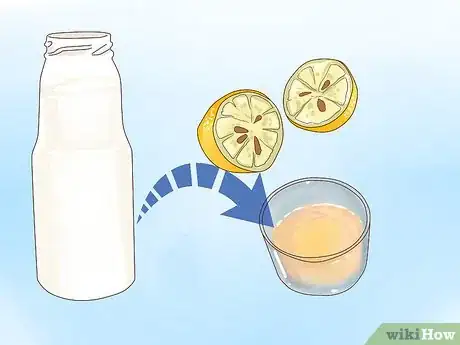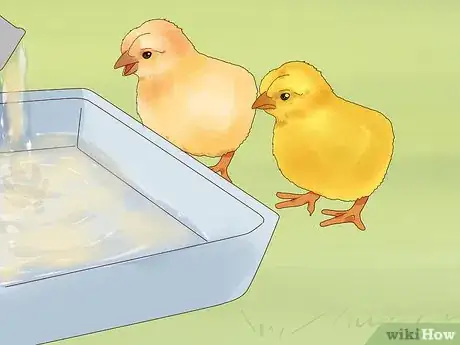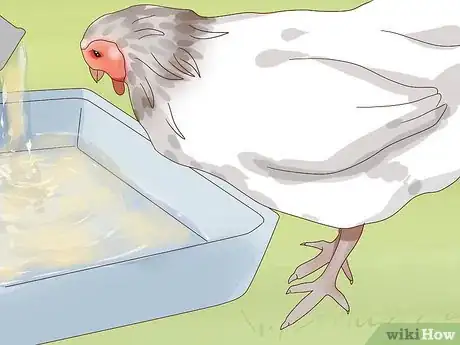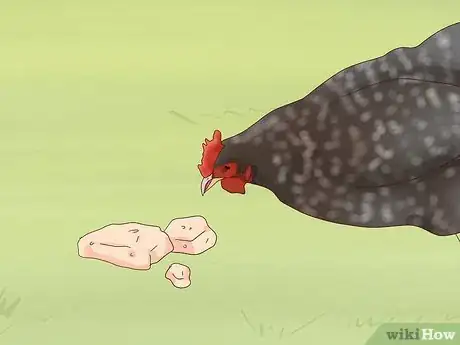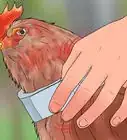This article was co-authored by wikiHow Staff. Our trained team of editors and researchers validate articles for accuracy and comprehensiveness. wikiHow's Content Management Team carefully monitors the work from our editorial staff to ensure that each article is backed by trusted research and meets our high quality standards.
There are 7 references cited in this article, which can be found at the bottom of the page.
wikiHow marks an article as reader-approved once it receives enough positive feedback. In this case, 100% of readers who voted found the article helpful, earning it our reader-approved status.
This article has been viewed 27,190 times.
Learn more...
Sour milk is milk that has begun to acidify, causing it to thicken up and coagulate. It is not the same as spoiled milk, which should not be consumed by people or animals. If you have chickens or hens, sour milk is a great treat and a fantastic source of protein to add to their food. By using only safe sour milk, and finding the right ways to feed it to your chickens, you can use up sour milk for hen food.
Steps
Making Sour Milk
-
1Combine vinegar or lemon juice with pasteurized milk. Pasteurized milk is almost always too processed in order for it to turn sour on its own, and is more likely to spoil instead. To make sour milk, measure out 1 tablespoon (15 ml) of vinegar, lemon juice, or another similar acid and pour it into a small bowl or glass. Add enough milk to make it up to 1 cup (250 ml).[1]
- Spoiled milk is milk that has begun to rot or has turned due to it being left out in the sun or going past its expiration date. This will often harbor harmful bacteria, and should not be consumed by yourself or your hens.
-
2Leave the milk to sit for 5 to 10 minutes. Stir together the acid and milk until they are thoroughly combined, then leave the milk mixture to sit out at room temperature for 5 to 10 minutes. The milk should begin to thicken up and coagulate until it reaches the consistency of buttermilk.[2]
- The acid in the vinegar or lemon juice will begin to curdle the milk, which is what causes it to thicken up.
- You can also leave the milk to sour in the refrigerator. Leave it to sit for 30 minutes in the fridge until it thickens up slightly.
Advertisement -
3Wait for raw milk to sour in the refrigerator. Raw milk is milk that comes straight from a dairy cow, meaning it is fresh, unpasteurized, and unhomogenized. Store your raw milk in the refrigerator for around 1 week, using it the same way you’d use pasteurized milk. After 1 week, your milk will begin to sour and thicken up.[3]
- The process of raw milk souring naturally is known as the milk “clabbering” as the curds and whey separate. Clabbered milk, or clabber, can be used for baking and is great for chickens, dogs, and hens.
Feeding Hens or Chickens
-
1Give chicks and hens sour milk to help them grow and make eggs. Milk contains high levels of the vitamin riboflavin, which is used to improve the quality of the eggs hatched by your hens. Pour a small amount of sour milk into a dish for your hens or chicks to help the chicks grow and give you better eggs.[4]
- Riboflavin, or B12, helps break down carbohydrates, proteins, and fats and convert them to energy used to help your chicks grow and the hens lay eggs.[5]
-
2Mix sour milk into the hen feed as an occasional protein supplement. Sour milk is high in protein, which will help your chickens to grow and may even help to fatten them up. Mix around 1 part of sour milk into 2 parts of your chosen hen feed once or twice a week to give your hens some extra protein.[6]
- Some chickens that are sold as meat are advertised as being milk-fed. Check your local guidelines to see if you’re giving your chickens enough milk to qualify for this label.[7]
-
3Make sour milk cheese to treat your hens. Sour milk can be easily turned into paneer, a traditional Indian cheese that makes a great treat for your hens. Heat the milk to around 175 °F (79 °C) until the curds and whey separate, before straining it through a cheesecloth. Let it cool and wrap it in the cheesecloth to shape it, squeezing out excess moisture as you do.[8]
- Break off a few pieces of cheese and scatter them in your chicken coop or pen. Your hens will find them and eat them over the course of an hour or two.[9]
Community Q&A
-
QuestionWe have commercial quantities of sour milk . How can we use your suggested solidifying method?
 Amy HarrisonTop AnswererLeave them out in the sun for a couple of days until solid/crumbly.
Amy HarrisonTop AnswererLeave them out in the sun for a couple of days until solid/crumbly. -
QuestionCan I feed my chickens homemade Mexican queso?
 Amy HarrisonTop AnswererIt depends what it consists of, but chickens love to eat table scraps, so it's most likely suitable. Anything they don't like, they just won't eat.
Amy HarrisonTop AnswererIt depends what it consists of, but chickens love to eat table scraps, so it's most likely suitable. Anything they don't like, they just won't eat. -
QuestionCan I do this with pasteurized milk that has gone bad?
 Community AnswerYes, it should have the same outcome.
Community AnswerYes, it should have the same outcome.
Warnings
- Raw milk that has soured, or milk that you have soured intentionally, are both safe to consume. Milk that has spoiled or gone off is not safe and should be thrown away immediately.⧼thumbs_response⧽
References
- ↑ https://www.gimmetasty.com/how-to-make-sour-milk/
- ↑ https://www.gimmetasty.com/how-to-make-sour-milk/
- ↑ https://www.treehugger.com/green-food/got-sour-milk-dont-throw-it-out.html
- ↑ https://www.gov.mb.ca/agriculture/livestock/production/poultry/poultry-rations-and-feeding-methods.html
- ↑ https://www.merckvetmanual.com/poultry/nutrition-and-management-poultry/vitamin-deficiencies-in-poultry
- ↑ https://www.theprairiehomestead.com/2013/05/20-ways-to-use-sour-raw-milk.html
- ↑ https://www.gov.mb.ca/agriculture/livestock/production/poultry/poultry-rations-and-feeding-methods.html
- ↑ https://www.thekitchn.com/how-to-make-paneer-cheese-in-30-minutes-cooking-lessons-from-the-kitchn-57008
- ↑ https://www.dummies.com/home-garden/hobby-farming/raising-chickens/how-to-pick-treats-for-chickens/
